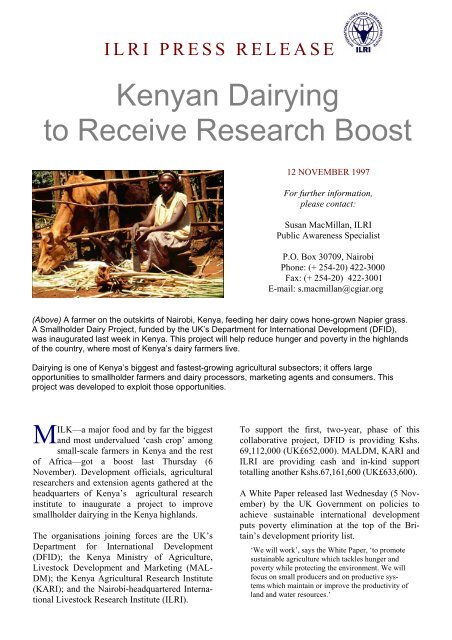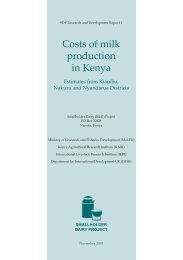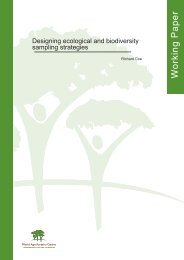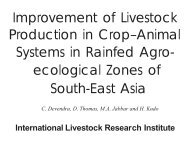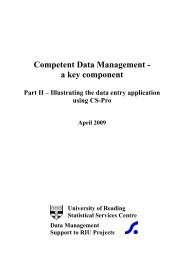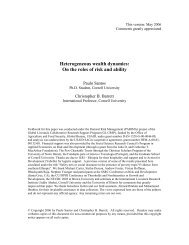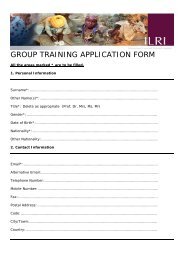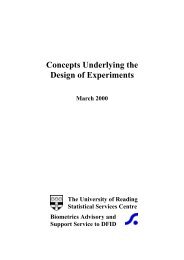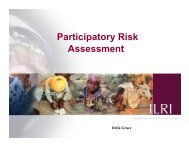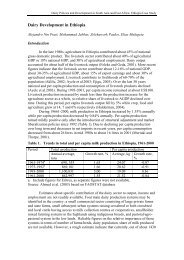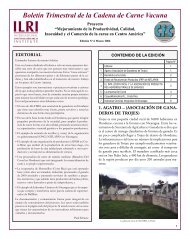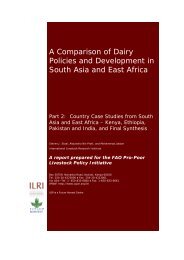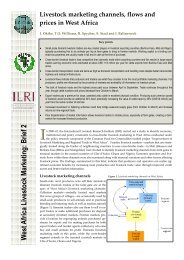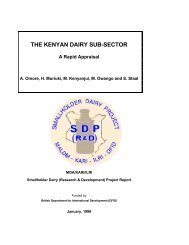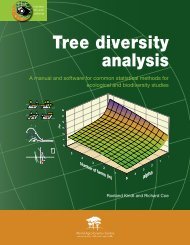& DENMARK - International Livestock Research Institute
& DENMARK - International Livestock Research Institute
& DENMARK - International Livestock Research Institute
Create successful ePaper yourself
Turn your PDF publications into a flip-book with our unique Google optimized e-Paper software.
ILRI PRESS RELEASEKenyan Dairyingto Receive <strong>Research</strong> Boost12 NOVEMBER 1997For further information,please contact:Susan MacMillan, ILRIPublic Awareness SpecialistP.O. Box 30709, NairobiPhone: (+ 254-20) 422-3000Fax: (+ 254-20) 422-3001E-mail: s.macmillan@cgiar.org(Above) A farmer on the outskirts of Nairobi, Kenya, feeding her dairy cows hone-grown Napier grass.A Smallholder Dairy Project, funded by the UK’s Department for <strong>International</strong> Development (DFID),was inaugurated last week in Kenya. This project will help reduce hunger and poverty in the highlandsof the country, where most of Kenya’s dairy farmers live.Dairying is one of Kenya’s biggest and fastest-growing agricultural subsectors; it offers largeopportunities to smallholder farmers and dairy processors, marketing agents and consumers. Thisproject was developed to exploit those opportunities.MILK—a major food and by far the biggestand most undervalued ‘cash crop’ amongsmall-scale farmers in Kenya and the restof Africa—got a boost last Thursday (6November). Development officials, agriculturalresearchers and extension agents gathered at theheadquarters of Kenya’s agricultural researchinstitute to inaugurate a project to improvesmallholder dairying in the Kenya highlands.The organisations joining forces are the UK’sDepartment for <strong>International</strong> Development(DFID); the Kenya Ministry of Agriculture,<strong>Livestock</strong> Development and Marketing (MAL-DM); the Kenya Agricultural <strong>Research</strong> <strong>Institute</strong>(KARI); and the Nairobi-headquartered <strong>International</strong><strong>Livestock</strong> <strong>Research</strong> <strong>Institute</strong> (ILRI).To support the first, two-year, phase of thiscollaborative project, DFID is providing Kshs.69,112,000 (UK£652,000). MALDM, KARI andILRI are providing cash and in-kind supporttotalling another Kshs.67,161,600 (UK£633,600).A White Paper released last Wednesday (5 November)by the UK Government on policies toachieve sustainable international developmentputs poverty elimination at the top of the Britain’sdevelopment priority list.‘We will work’, says the White Paper, ‘to promotesustainable agriculture which tackles hunger andpoverty while protecting the environment. We willfocus on small producers and on productive systemswhich maintain or improve the productivity ofland and water resources.’
Holistic approach to Kenyan dairy developmentThe UK-funded dairy research project for Kenyainaugurated last week will attack poverty in severalways. ‘About 75 percent of Kenya’s milkproduction comes from small-scale farmers’,said Mr. R.K. Langat, Director of <strong>Livestock</strong>Production and Marketing in the Ministry of Agriculture,<strong>Livestock</strong> Development and Marketing.‘This project is designed specifically to improvetheir production. We are grateful to theBritish Government for financing the project andhope its results will expand to cover dairy productionthroughout the country.’understanding of how small-scale farming systemswork, new approaches to old problems, andnew opportunities for research-based interventionsto help solve those problems.‘Rich’ Dairy <strong>Research</strong> PartnershipOne month go, KARI and ILRI jointly receivedthe ‘CGIAR Chairman’s Award for ScientificPartnership’ at the annual Washington, D.C.-gathering of the world’s leading food researchgroup, known as the Consultative Group on<strong>International</strong> Agricultural <strong>Research</strong> (CGIAR).Kenya’s Permanent Secretary for the Ministryfor <strong>Research</strong>, Technical Training and Technology,the Honourable Mr. Wamatu Njoroge, acceptedthe award, which includes a cash prize ofUS$5,000, on behalf of KARI and ILRI. Earlierin October, the project was presented to an internationalaudience at the 1997 World Food PrizeSymposium, in Des Moines, Iowa, by Dr. CyrusNdiritu, Director of KARI.(Below) Representatives of the collaborating organisationswho participated in the inaugural of the DFID-funded,MALDM-implemented and KARI- and ILRI-conductedSmallholder Dairy Project event included:(from left) Dr. Hank Fitzhugh, Director General of ILRI;Ambassador P.K. Mathanjuki, Deputy Secretary inthe Ministry of <strong>Research</strong>, Technical Training and Technology;Dr. Cyrus Ndiritu, Director of KARI; the HonourableMr. Jeffrey James, British High Commissioner to Kenya;and Mr. R.K. Langat, Director of <strong>Livestock</strong> Production andMarketing, MALDM.(Above) In Kenya and Africa as a whole, smallholderdairying generates more regular income than any otherrural enterprise. Globally, the market value of milkproduction is second only to rice in the arid and semi-aridtropics and subtropics of South and Southeast Asia,second to beef in the subhumid tropics and subtropics ofSouth and Central America, and exceeds all other foodcommodities, including coffee, in the warm humid tropics ofSouth and Central America (Strategy and priority Paper,Technical Advisory Committee of the CGIAR, 1992).Every component of the Kenyan dairy enterprise—fromdairy consumption to animal feeding,from manuring of croplands to milk production,from dairy processing to marketing—willbe analysed to search out opportunities for enhancingsustainable dairy enterprises. The ruraland urban poor who are the targeted beneficiariesof the project include dairy farmers, processors,merchants and consumers.Every relevant kind of expertise—socioeconomics;ecology; forage agronomy; animal production,nutrition and breeding; farming systemsanalysis; agricultural extension—will be exploitedto disclose new data and information, newThe organisations joining forces last week togive millions of small-scale dairy workers andconsumers a boost have thus already demonstratedan exceptional ability to work togetherclosely and productively. ‘This project startedmany years ago’, said Dr. Ndiritu, in welcomingguests to the KARI-hosted inauguration of theSmallholder Dairy Project. ‘If word of thisproject has reached your desk only recently’, hesaid, ‘you should know that its history is rich.’
The Honourable Mr. Jeffrey James, British HighCommissioner to Kenya, was also impressed bythe strength of this project’s beginnings. ‘Strongpartnership is a key feature of the SmallholderDairy Project which we are launching today’, hesaid.agronomic and animal feeding strategies thatentail the planting of recommended foragelegumes. By fixing nitrogen at their roots, theseforages feed soils as well as animals, and thushelp small farmers sustain as well as intensifytheir production systems.• ‘I have been impressed to learn about the highlyparticipatory way in which this project has evolved and inwhich it will be implemented. . . .• ‘I should like to take this opportunity to congratulateKARI and ILRI on their joint receipt of the CGIAR “ScientificPartnership” award presented in recognition of theoutstanding dairy research work in the coastal area ofKenya, which has provided the stimulus for this newproject.• ‘Perhaps this project is a model in a small butimportant way’, the British high Commissioner said at the6 November inauguration of the Kenya Smallholder DairyProject.• ‘I believe that it will work precisely because of theshared commitment by the key partners, and becausethe involvement of the intended beneficiaries and otherstakeholders is a key part of project design andimplementation. I will follow its progress with greatinterest.’The Partnership Award was presented to KARIand ILRI for a seven-year collaborative dairyproject they jointly conducted with MALDM toexploit opportunities in smallholder dairying toimprove household nutrition, food security, incomeand employment at the Kenya Coast.These national and international research partnersidentified and resolved biological, socialand economic constraints to smallholder dairydevelopment in the region.All members of the project applied a ‘production-to-consumptionsystems approach’ to theirwork, which ensured that the research wasdriven by smallholder problems and responsiveto consumer demands. Results of the KARI-ILRIdairy work showed that small farmers adoptindividual technological components one at atime rather than taking up multi-componentpackages all at once. Subsequent KARI andMALDM dairy work at the Coast has aimed atproviding dairy farmers in the region with arange of technological options, such as improved<strong>Research</strong> as a weapon against poverty‘<strong>Research</strong> is an important weapon in the fightagainst poverty’, says yesterday’s UK WhitePaper on <strong>International</strong> Development.‘Without research, many development interventionswould fail or be much less successful;and research has significant multipliereffects—solutions to the causes of poverty inone part of the developing world may well bereplicable in another.’With 1.3 billion of the world’s people living inextreme poverty, the world will have to harnesseverything research has to teach it.EndINTERNATIONAL LIVESTOCK RESEARCH INSTITUTEConducting research in animal agriculture to reduce hunger, poverty and environmental degradation in developing countries.P.O. Box 30709 Nairobi, Kenya Phone: + (254-20) 422-3000 Fax: + (254-20) 422-3001 E-mail: ILRI-Kenya@cgiar.org


